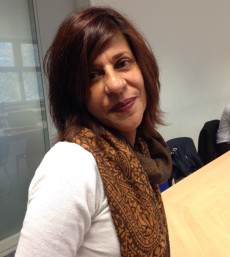Shabnam Gulamhussen was teaching in the Ismaili Religious Education Centre in Lisbon, Portugal, when she conducted her action-research in 2016. In her investigation into the use of collaborative writing, she aimed at understanding the challenges and opportunities of implementing collaborative writing in the classroom; the role of group discussion in the process of co-authoring texts; and to collect students’ accounts of their collaborative writing experience. Her findings suggest that collaborative writing is a complex social activity entailing several challenges concerning the nature of tasks, type of grouping, power relations, conflict, and ownership of texts. These require the teacher to be a careful planner and organiser of authentic collaborative writing tasks while building an emotionally safe classroom environment. Her study highlights that in collaborative writing tasks, group discussion engages students in productive talk for planning, writing, and providing critical peer feedback. The report concludes by stressing the potential of collaborative writing in promoting content learning and development of interpersonal skills.
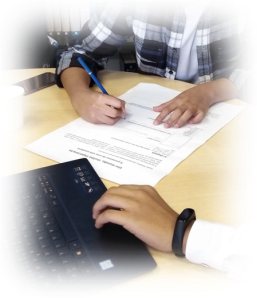 My interest in the relationship between writing and learning emerged from my engagement with narrative enquiry during the MTeach’s innovative Leading Learning module (which uses journaling to create data about teaching and learning). The experience of narrating my exploration of student talk in group discussion led me to discover that in the process of composing a text there is a continuous dialogue with others. Even when undertaken individually, writing resembles a conversation: between the writer and herself and her text, between the writer and those whose contributions are imprinted in the text, and between the writer and her community of readers. This means that the learning derived from writing occurs in a dialogic activity (an interest of mine which is also reflected in my first exploration of classroom talk in my masters’ coursework). At the end of my master’s degree journey, having strengthened an understanding of writing as a dialogic and collaborative process, I set out to investigate the learning potential of collaborative writing in a Portuguese religious education classroom. The main purpose of my research was to gain insights into the opportunities and challenges of implementing collaborative writing that could inform my future practice.
My interest in the relationship between writing and learning emerged from my engagement with narrative enquiry during the MTeach’s innovative Leading Learning module (which uses journaling to create data about teaching and learning). The experience of narrating my exploration of student talk in group discussion led me to discover that in the process of composing a text there is a continuous dialogue with others. Even when undertaken individually, writing resembles a conversation: between the writer and herself and her text, between the writer and those whose contributions are imprinted in the text, and between the writer and her community of readers. This means that the learning derived from writing occurs in a dialogic activity (an interest of mine which is also reflected in my first exploration of classroom talk in my masters’ coursework). At the end of my master’s degree journey, having strengthened an understanding of writing as a dialogic and collaborative process, I set out to investigate the learning potential of collaborative writing in a Portuguese religious education classroom. The main purpose of my research was to gain insights into the opportunities and challenges of implementing collaborative writing that could inform my future practice.
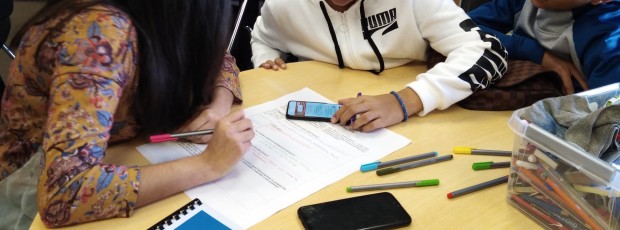 I used multiple research methods for collecting data, namely individual and focus group interviews, classroom observation and audio-recording of student-student interactions, and students’ reflections. These produced rich data on pupils’ collaborative writing experiences, the nature and role of group discussion while co-writing, and students’ accounts of their collaborative writing experiences. My field notes were an ongoing part of my research, allowing me to reflect in-action, in a spontaneous manner dealing with the here and now of situations, as well as to reflect on-action, when I recollected classroom events, thoughtfully considered my experiences, critically examined them and planned for improved practice.
I used multiple research methods for collecting data, namely individual and focus group interviews, classroom observation and audio-recording of student-student interactions, and students’ reflections. These produced rich data on pupils’ collaborative writing experiences, the nature and role of group discussion while co-writing, and students’ accounts of their collaborative writing experiences. My field notes were an ongoing part of my research, allowing me to reflect in-action, in a spontaneous manner dealing with the here and now of situations, as well as to reflect on-action, when I recollected classroom events, thoughtfully considered my experiences, critically examined them and planned for improved practice.
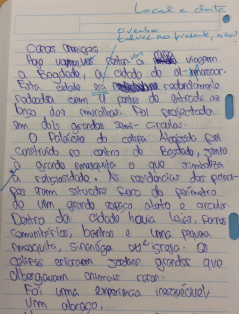 During the research, I implemented different kinds of collaborative writing tasks, such as a news article, a role-play script, a letter, and a story followed by peer feedback. The type of tasks, issues related with student grouping and pupils’ prior experiences of doing group work were factors that caused tensions, some of which became critical incidents, at times shaking my confidence; however, these moments also moved me to become more conscious and sensitive to emotional aspects playing out in the classroom and help my students to learn to regulate their feelings, to handle conflicts and to be more supportive of their peers.
During the research, I implemented different kinds of collaborative writing tasks, such as a news article, a role-play script, a letter, and a story followed by peer feedback. The type of tasks, issues related with student grouping and pupils’ prior experiences of doing group work were factors that caused tensions, some of which became critical incidents, at times shaking my confidence; however, these moments also moved me to become more conscious and sensitive to emotional aspects playing out in the classroom and help my students to learn to regulate their feelings, to handle conflicts and to be more supportive of their peers.
From my findings I highlight the following:
- As novice writers, when learner are exposed to tasks encouraging them to share and negotiate viewpoints, if ground rules are not laid out at the start, collaboration may not be successful.
- Friendship grouping is not necessarily an effective approach as it may lead to struggles over leadership, unsettled conflicts, and peer discouragement.
- The nature of tasks is critical for real collaboration to occur; for instance, expository writing, because it is structured and offers clear solutions, does not promote group discussion, joint writing, and shared ownership of texts. On the other hand, expressive writing, due to its more open-ended nature, fosters authentic student-student discussion on how to go about writing and collectively make meaning of the content.
- Peer review and feedback encourage reflection on and assessment of students’ own work since it raises awareness of potential improvements to their own writing.
- Co-writing helps students, learn the curriculum content, build interpersonal relationships, develop a sense of responsibility for supporting each other, as well as the ability to listen to and accept different perspectives while becoming confident on their language abilities.
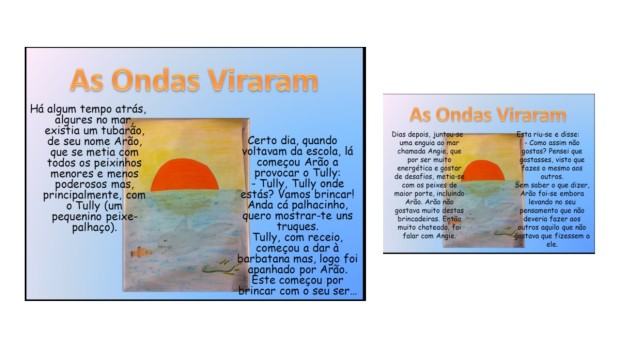 While doing action research was a complex activity, it allowed me to link theory and practice through a thorough exploration of the literature that supported my study, as well as to learn how to implement collaborative writing in the classroom. During my inquiry, the opportunities to reflect in action and in retrospect, allowed me critically to examine my teaching approaches and to remain focused on my research questions. The new questions that surfaced from my data suggested new ways of looking at my topic and encouraged a deeper understanding of my classroom practice and the research process. This represented an opportunity to learn, not only about how to teach collaborative writing and about doing research, but more importantly, to learn about my pupils and how they learn.
While doing action research was a complex activity, it allowed me to link theory and practice through a thorough exploration of the literature that supported my study, as well as to learn how to implement collaborative writing in the classroom. During my inquiry, the opportunities to reflect in action and in retrospect, allowed me critically to examine my teaching approaches and to remain focused on my research questions. The new questions that surfaced from my data suggested new ways of looking at my topic and encouraged a deeper understanding of my classroom practice and the research process. This represented an opportunity to learn, not only about how to teach collaborative writing and about doing research, but more importantly, to learn about my pupils and how they learn.
My inquiry allowed me to intertwine two kinds of collaborative writing: co-authored student writing in the classroom and single-authored writing in my report. Both opened windows into the value of collaboration, dialogue and writing for learning.
